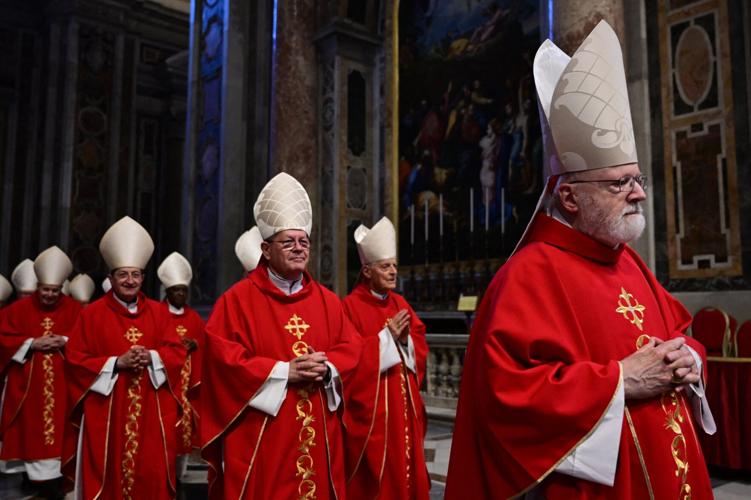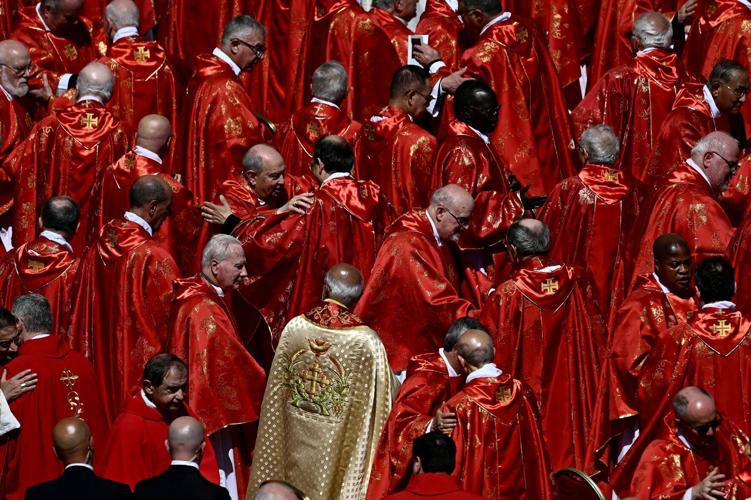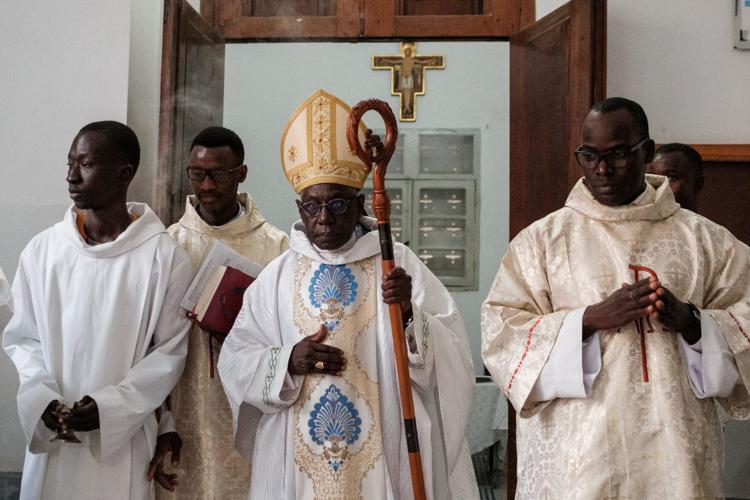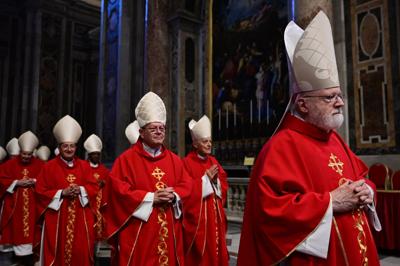Divining who will become the next pope is the devilŌĆÖs work.
It raises false idols ŌĆö the so-called papabili, or front-runners ŌĆö to be worshipped or denigrated. It promotes conflict between the various strains of Catholic faithful, pitting progressives against traditionalists.
Will Catholics cast their lot with the charismatic Filipino karaoke cardinal being bashed for : “Imagine there’s no heaven ...”? What about the Congolese candidate who ?
Or is it time to place the papal mitre once again atop an Italian head?
To pose the question is to become lost in the legend, mystery and shadow of the papal election process; to assign secretive strategies to a process that the majority of the cardinals will be participating in for the first time.
As one veteran cardinal from South Africa ŌĆö who will not be voting for the next pope because he has passed the 80-year-age ceiling ŌĆö┬Ā, a Catholic news outlet: ŌĆ£I went into the first one not knowing who the heck I’m going to vote for because I didn’t know anybody really.ŌĆØ
And yet, as the worldŌĆÖs Roman Catholic cardinals prepare to enter the Sistine Chapel for next WednesdayŌĆÖs conclave we fumble forward in the dark, like Catholicologists trying to peer through a gilded curtain, guided by the best guesses of veteran Vatican watchers.
Will the church opt for continuation after the death of Pope Francis or a course-correction after the Argentinian reformerŌĆÖs 12-year reign?
Is there a back-to-biblical-basics revolution in the books for the ancient institution?
And what sort of transformation can the modern world expect, really, when 133 middle age and elderly men cleared to vote ŌĆö the so-called princes of the church ŌĆö select one of their own to lead the worldŌĆÖs 1.4 billion Catholics into the future?
The Vatican has announced that the conclave will take place on May 7 to elect the next pope. Reporter Nicole Thompson explains the process and whether Canada has any contenders. (April 28, 2025 / The Canadian Press)
One hundred and eight of the voting-age cardinals ŌĆö 80 per cent of the total ŌĆö were appointed by Francis himself, noted Mark McGowan, a professor of history who specializes in the Catholic Church.
ŌĆ£For the most part, those are the ones who are going to be, I think, critical in making a judgment about whether or not they want this very engaged pastoral papacy to continue with FrancisŌĆÖ successor,ŌĆØ he said.
Pastoral, meaning a papal reign marked by outreach and advocacy for the downtrodden and the marginalized ŌĆö those who might have every reason to doubt the existence of a benevolent higher power.
ŌĆ£He created a group of men that were exactly as he was: shepherds with the smell of their flock.ŌĆØ

This handout picture shows cardinals queuing in the Sistine Chapel to swear on the Bible to never reveal the secrets of their deliberations before the start of the last papal conclave at the Vatican on March 12, 2013. Catholic cardinals will begin on May 7, 2025, the conclave to elect a successor to Pope Francis.
HANDOUT OSSERVATORE ROMANO/AFP/VIA GETTY IMAGESBut every good election includes a robust call for change, and the VaticanŌĆÖs theocratic exercise to pick a new leader is no different.
┬ĀLongtime church observer this week that Francis was ŌĆ£openly attackedŌĆØ by a few top cardinals over the changes he imposed to church governance and oversight, leaving a bitter taste with loyalists.
Dissenters stalked Francis throughout his papacy.
He came under fire from conservative clerics for, among other things, allowing church blessings for civil same-sex marriages, naming lay people to top church positions, restricting the saying of the traditional Latin mass, and famously responding, when asked about homosexuality: ŌĆ£If a person is gay and seeks God and has good will, who am I to judge?ŌĆØ
Factions within the church believed, and continue to insist, that the imposition of clear religious rules and calling out those who stray from them is exactly the job of a pope, and one they want to see in Francis’ successor.
Among the critics this week, according to OŌĆÖConnell, was an Italian cardinal seen as the campaign manager for 70-year-old , the Vatican secretary of state, a longtime top diplomat.
Parolin’s behind-close-doors pitch to voting cardinals is entirely political: elect a moderate, middle-ground, compromise candidate to heal the dangerous divisions.
But there was also a reminder of the stakes involved in picking the successor to St. Peter, the proverbial rock upon which the Catholic Church was founded, when Parolin’s blood pressure reportedly spiked this week sending Vatican doctors scrambled to his aid.
Cardinals will be looking for someone who is of sound faith, yes. But it also takes a sturdy mind and body to fulfil such a gruelling to-the-grave job. That there is an array of highly qualified cardinals to choose from could be both a blessing and a curse.
If the consensus is to continue in Francis’ footsteps, the College of Cardinals may look to someone like , the 67-year-old from the Philippines, for his moderate, down-to-Earth approach. Coming from a country where 80 per cent of the population identifies as Catholic makes Tagle a logical contender heading into the conclave.
But there are many other considerations.
France’s , 66, is another candidate on the church’s progressive wing, said to be favoured by Francis himself as a successor. But he’s received bad press in Italy after reports that French President Emmanuel Macron is actively promoting his bid in backroom meetings ŌĆö an apparently heretical mixing of civilian and ecclesiastical politicking.
Born in Algeria when it was a French colony, Aveline is said to be particularly sensitive to the suffering of migrants and open to dialogue with other faiths. But his reportedly poor grasp of Italian could doom his candidacy, given that it’s the lingua franca of the Roman Catholic Church.┬Ā
Among the Catholic conservatives, Congolese is thought to be a popular choice. This, after he objected to a Vatican decision to allow the blessing of same-sex marriages, then┬Ā after warning about “potential confusion and scandal within the Church community.”

Cardinals embrace after late Pope Francis’ funeral ceremony at St Peter’s Square at the Vatican on April 26, 2025.┬Ā
FILIPPO MONTEFORTE AFP via GettyWorking in favour of the 65-year-old, too, is the strength of the church on the African continent, where some 265 million people call themselves Catholics. Another African contender, , who was named the world’s youngest bishop in 1979, at the age of 34. Now aged 79, the hardliner will likely be judged too old to succeed Francis.
Another argument is that it’s time for an Italian to occupy the papal apartments for the first time since the term of Pope John Paul I, who died in office from a heart attack after just 33 days.
The shortest papal term in the church’s 2,000-year history was followed by the Poland’s Pope John Paul II’s eventful 26-year reign; a seven-year run by Pope Benedict XVI that ended with his resignation and ushered in Francis.
Apart from Cardinal Parolin, is a native Roman who grew up in the church, with his father being a Vatican journalist and his mother’s uncle an influential cardinal. He has the reputation as a left-leaning activist cleric who, in 2022, presided over a special “Thanksgiving mass” for a gay couple married in a civil ceremony in Bologna at a time before official blessings of a same-sex union were allowed.
Another interesting Italian candidate is the Patriarch of Jerusalem, .
He’s been based in Israel for decades, but with the outbreak of the Israel-Gaza war, his task has been the literal saving of souls threatened by the conflict, all while walking a delicate political tightrope. The urgency of his current mission, as well as the fact that he was only named a cardinal in 2023 and is still a relatively young 60 years old, might be convincing arguments in favour of pushing him off to a future conclave.
McGowan, of the University of Toronto, saw those put forward by Francis as cardinals as part of a deliberate effort to broaden and diversify the church’s senior-most ranks.
“We have cardinal bishops from places that would not have imagined they’d ever have before,” he said. “Mongolia, Myanmar, Mauritius, East Timor, Guatemala ŌĆö you know, the list goes on and it passed over some of those traditional areas that expected it.”
One of his own dark-horse picks is Brazil’s , a 64-year-old promoted only in December, who has advocated the incorporation of indigenous Amazonian culture into the traditional Catholic mass and cautious openness toward allowing married men to be ordained so as to combat the shortfall of priests.┬Ā
“This guy speaks Spanish, Portuguese, Italian, English, French, Indonesian, Swahili, Croatian,” McGowan said. “The guy is a phenom in terms of language and he’s young and dynamic ... He’s on nobody’s list right now.”
McGowan said that the focus on the church’s declining population and influence in Europe and North America has obscured the growth and development in other parts of the world.
“That’s why I would be very, very surprised if it was a hardline European that was elected to the office. All of the evidence seems to point elsewhere,” he said.
“But you know what? We’ve all been wrong before. I’ve been wrong many times. Catholics believe it’s the Holy Spirit who makes the choice.”
In other words: who knows who will emerge in St. Peter’s Square after the white smoke billows from the papal chimney?
God, only, knows.




































